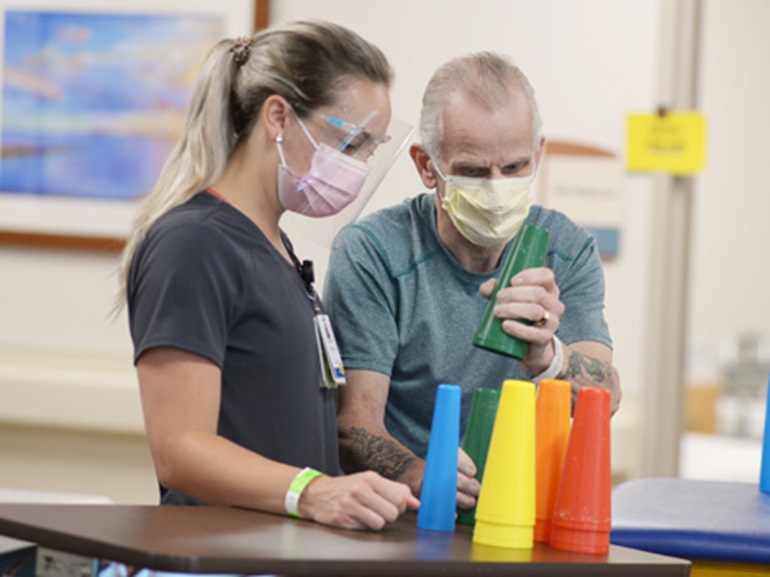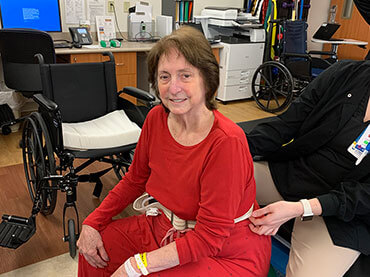Neurologic Rehabilitation
New treatment brings new hope

We're here to help
Learning to live with the progressive effects of neurological diseases can be physically and emotionally difficult. Our neuro-rehabilitation specialists understand how challenging this may be for you and your loved ones. We’re here to help, by providing advanced treatment, strategies and support to best maintain your independence and enhance your quality of life.
-
We treat a range of neurologic conditions such as:
- Stroke
- Amyotrophic lateral sclerosis (ALS or Lou Gehrig’s disease)
- Demyelinating polyneuropathy
- Guillain-Barré syndrome
- Multiple sclerosis
- Parkinson’s disease
- Peripheral neuropathies
- Transverse myelitis
- Glioblastomas or other cancer-related brain tumors
-
At TriHealth Rehabilitation Hospital, our experienced team of neuro-rehabilitation specialists addresses a range of physical and functional issues including mobility, speech and cognition.
This interdisciplinary team is led by a physiatrist, a physician board-certified in physical medicine and rehabilitation and includes rehabilitation nurses; physical and occupational therapists; speech-language pathologists; pharmacists; case managers and other clinical and support staff, as needed.
Your family members are an important part of the care team and may be asked to participate in therapy sessions to learn about your condition and how to best support you.
-
Every neurologic disease presents its own set of challenges and each patient will respond differently. That’s why we carefully tailor treatment to meet each patient’s needs, helping to:
- Restore or maintain physical function
- Enhance skills to perform daily activities
- Maximize strength, balance and mobility
- Improve speech and swallowing
- Manage pain, spasticity or other complications
- Manage medications
- Adjust to social, emotional or behavioral changes
- Improve independence
We apply evidence-based best practices to help you build or maintain strength and skills. Our approach includes hands-on activities with some aided by high-tech therapy equipment. Therapy sessions will occur three hours per day five days per week, or 15 hours over a seven-day period, depending on your tolerance and ability to actively participate.
-
Patients with neurologic diseases may benefit from the advanced technologies and proven therapies TriHealth Rehabilitation Hospital offers, including:
- Robotic equipment such as the Armeo Spring Trainer® which helps boost recovery of motor skills
- Body-weight supported treadmill training and electrical stimulation of the legs to improve balance, gait and walking
- Electrical stimulation of the arm, mirror therapy and other strategies to improve upper extremity and hand function
- VitalStim®, non-invasive, external electrical stimulation applied to the neck to treat swallowing disorders
- Computer-based exercises to improve memory, concentration, decision-making and other cognitive skills
- Bioness Integrated Therapy System (BITS), a large, touch screen digital display with programmed exercises to improve physical, visual, auditory and cognitive abilities of individuals with deficits in these areas
- Fiberoptic endoscopic evaluation of swallowing (FEES), a test used to assess how well you swallow
- Adaptive gaming to support social integration and recreational inclusivity
-
Your ability to perform daily activities at home, work, school or in the community is critical to your independence. Your therapy team may introduce a variety of tools, techniques and strategies to help you manage these tasks, such as, adaptive equipment to extend your reach (reachers) or other devices to help you get dressed, prepare meals and eat.

Managing neurologic disease. Let us help.
We will work closely with you, and your family, physician/neurologist and/or the referring hospital to ensure a smooth transition to TriHealth Rehabilitation Hospital.